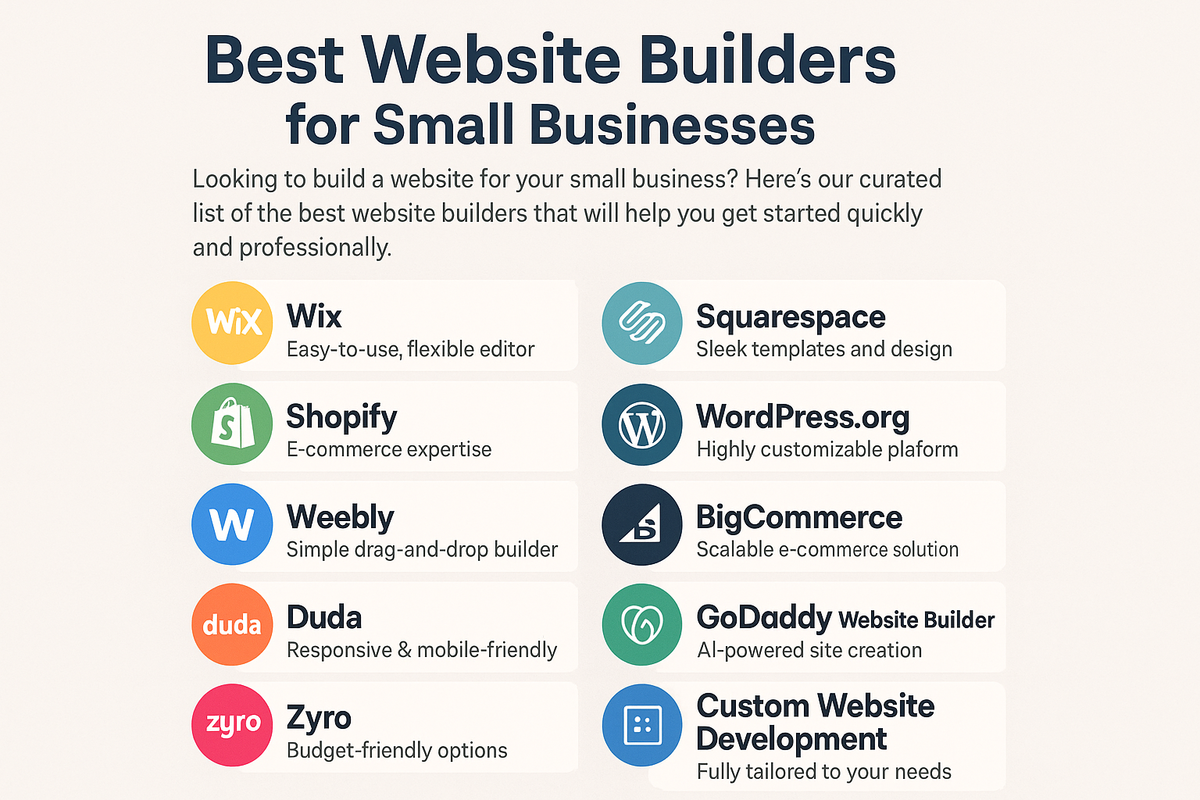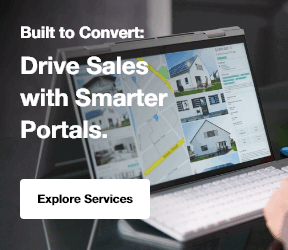Why does choosing the right website builder matter for small businesses?
For today’s small businesses, a website is more than just an online presence, it’s often the first impression that shapes whether a potential customer trusts your brand.
If your website is slow, unprofessional, or hard to navigate, users leave within seconds. In fact, 88% of consumers won’t return to a site after a bad experience (Sweor).
But here’s the challenge: many entrepreneurs and new business owners struggle with one key question, “What website should I use for my small business?”
With dozens of options promising simplicity, affordability, or advanced features, the decision can feel overwhelming.
The answer depends on your goals. Are you starting a service-based company and need a site with clear contact forms?
Launching an e-commerce business that requires product pages, payment gateways, and shipping calculators? Perhaps you’re a consultant who needs a simple yet polished professional website.
The good news: whether you’re looking at a website builder free plan or considering a custom website for business, there are plenty of options in 2025 to match your needs.
In fact, choosing the Best Website Builder for Small Business can be the key to success, ensuring your site is both user-friendly and functional.
This blog examines the top website builders for small businesses, compares popular solutions, breaks down costs, and addresses the most frequently asked questions about creating websites for small businesses. What Is a Website Builder?
What is Website Builder?
A website builder is a tool that enables individuals or businesses to create a website without requiring extensive technical knowledge.
There are three types of web builders:
1. Drag-and-Drop Builders
- Platforms like Wix, Squarespace, and Weebly.
- Best for non-technical users who want to create website layouts quickly.
- Templates and visual editors make setup easy.
2. E-commerce Website Builders
- Shopify, BigCommerce, and WooCommerce (WordPress plugin).
- Built for selling products, inventory management, and payment integrations.
- Good for businesses looking to grow into online stores.
3. Professional Website Builders / CMS Platforms
-
WordPress.org, Joomla, Drupal, or custom-built solutions.
- Provide full scalability, advanced SEO, integrations, and personalization.
- Best for businesses ready to invest in a professional website for business.
With tools like AI SEO software emerging, businesses are now focusing more on automated solutions to boost their online presence without extensive effort.
For example, best SEO reporting tools can help track the effectiveness of your website’s SEO strategy by providing easy-to-understand insights into its ranking, traffic, and performance.
The rise of AI-powered builders has made 2025 even more interesting. Platforms like Zyro and Bookmark use AI to auto-generate page layouts based on your industry.
While innovative, they’re not always a substitute for a custom website for a business that aligns with long-term goals.
In highly regulated sectors like Oil, Gas and Renewables, businesses often require robust platforms like WordPress or custom builds to handle documentation, safety updates, and compliance disclosures.
For businesses in Travel and Tourism, AI tools may assist with fast launches, but custom web design ensures brand storytelling and mobile performance meet traveler expectations.
Free vs Paid Website Builder for Small Businesses
Many small business owners start their journey by Googling “free small business website builder” or trying regional options like a free South African website builder or a free Canadian website builder. While these tools are tempting, it’s important to weigh the pros and cons.
1. Free Website Builders
Pros:
- No upfront cost.
- Fast setup, some platforms let you launch in minutes.
- Great for testing an idea or a “starter” online presence.
Cons:
- Limited customization.
- Ads are displayed on your site.
- Poor SEO capabilities.
- Generic templates, leading to a less professional look.
- Limited storage and bandwidth.
These strategies help improve website traffic and, by extension, business performance.
Free tools are fine for freelancers or hobby projects. But when making web pages for business, credibility is key. Imagine pitching enterprise clients with a site that shows a builder’s branding at the bottom, most decision-makers won’t take you seriously.
2. Paid or Professional Website Builders
Pros:
- Custom domains (yourname.com instead of “builder.com/yourname”).
- No ads.
- Advanced features (SEO tools, integrations, analytics).
- Better templates and user experience.
Cons:
- Monthly/annual costs ($10–$50 for DIY, thousands for custom solutions).
- May require professional support.
Centric’s web design and mobile development services focus on creating professional websites for business that evolve with your goals, something no free builder can guarantee.
Also Read: What are five marketing strategies that retailers spend half of their annual budget on
Explore Our Web Design & Development Services!
10 Best Website Builder for Small Businesses in 2025
Looking to build a professional online presence for your small business in 2025? The right website builder can make all the difference, offering ease of use, scalability, and powerful features.

Choosing the best website builder depends on your goals. Below are some top players ranked by use case:
1. Wix
- Known as one of the most good website builders for startups.
- Drag-and-drop editor, hundreds of templates, and a free plan.
- Great for quick builds, but limited scalability.
2. Squarespace
- Focuses on design, perfect for creatives.
- Offers visually striking templates.
- Ideal for making websites for small businesses in fashion, photography, or design.
The Food and Beverage sector also benefits from Squarespace’s stunning layouts that showcase visual content like menus, plating, and product packaging.
3. Shopify
- The best option for a website for online business.
- Optimized for selling products, managing inventory, and scaling e-commerce.
4. WordPress.org
- Powers 43% of the web.
- Best for businesses requiring blogs, advanced SEO, or a custom website for business growth and development.
- Flexible but requires more setup.
5. Weebly
- Affordable and beginner-friendly.
- Ideal for starting business websites on a tight budget.
6. BigCommerce
- Suited for scaling online stores beyond Shopify.
- Enterprise-level features are built into the platform.
7. Duda
- Prioritizes mobile responsiveness.
- Perfect if most of your customers access your site on mobile.
8. GoDaddy Website Builder
- Bundled with hosting.
- Simple but limited compared to others.
9. Zyro
- AI-driven builder for quick launches.
- Useful for entrepreneurs who want speed over control.
10. Custom Website Development
- Built by agencies like Centric.
- Designed for scalability, SEO, and integration with business tools.
- Best for companies needing a professional website builder and future-proof digital strategy.
For businesses looking to drive organic SEO services, a platform like WordPress allows extensive customization, which helps boost SEO ranking when combined with effective SEO audit pricing and using SEO ranking report tools to track performance.
Can You Build Your Own Website or Should You Hire Professionals?
This is where many entrepreneurs ask: “Can you build a website yourself?”
1. DIY Website Builders
- Best for small budgets.
- Platforms like Wix or Squarespace allow you to create website layouts without coding.
- Downsides: generic appearance, limited SEO capabilities, and limited flexibility.
2. Professional Website Builder / Agency
- Provides a custom website for business with branding and features aligned to your needs.
- Ensures you don’t just “have a site,” but rather a professional website for business that builds trust.
- Offers integrations with marketing automation, CRMs, and analytics.
- Can help with how to get into digital marketing by aligning your website with your overall strategy.
Cost of Website Builders for Small Businesses
Here’s what small businesses should expect to pay in 2025:
- Free website builder for small business → $0/month, but limited.
- DIY paid platforms → $10–$50/month.
- E-commerce platforms → $30–$300/month.
- Professional custom website build → $2,000–$10,000+ plus maintenance.
Real estate firms investing in custom real estate websites can expect advanced features like listing integrations, virtual tours, and CRM pipelines to be included.
Hidden costs also include:
- Domain name ($10–$20/year).
- Hosting ($5–$50/month if not included).
- Premium themes/plugins ($50–$200/year).
For businesses that want credibility, investing in a business website builder early delivers long-term ROI. Creative services ensure your site is not just functional but also visually aligned with your brand identity.
What Website Should I Use for My Small Business?
Choosing the right website builder is crucial for establishing a strong online presence for your small business.
The best platform for you will depend on your specific needs, such as ease of use, design flexibility, e-commerce capabilities, and budget.
The answer depends on your stage:
- Starting business website fast: Wix or Squarespace.
- Selling products: Shopify or BigCommerce.
- Content-focused business: WordPress.
- Long-term scalability: Custom-built
For entrepreneurs thinking “I need a website for my business,” the right choice balances cost, ease of use, and growth potential. Digital marketing services ensure your site doesn’t just exist it performs.
Explore Our Digital Marketing Services!
FAQs: Best Website Builder for Small Businesses
What is the best website to start a small business?
For beginners, Wix or Squarespace. For e-commerce, Shopify is the best website maker for small business.
Can I build my own website for a small business?
Yes, but while DIY tools let you create website pages quickly, a professional website builder ensures scalability, SEO, and branding.
What website builder is free?
Platforms like Wix Free, WordPress.com Basic, or regional tools like a free South African website builder and a free Canadian website builder.
Which website builder is best for long-term growth?
WordPress or a custom website for business built by professionals offers the most scalability.
What website should I use for my small business in 2025?
For fast setup: Wix. For online stores: Shopify. For long-term ROI: a professional website builder through Centric.
Conclusion: Which Website Builder Is Best for Small Businesses in 2025?
So, what is the best website builder for small businesses? The answer depends on your goals:
- DIY web builders are fine for testing ideas.
- Shopify and BigCommerce excel for online business websites.
- WordPress works best for content-heavy brands.
- A custom website for business is the best option for credibility, scalability, and long-term growth.
For small business owners focused on B2B and B2C marketing strategies, choosing a platform that supports long-term growth, like WordPress or custom development, is key.
At Centric, we don’t just deliver websites, we deliver results. By combining web design and mobile development services with B2B marketing services, we help small businesses compete confidently in the digital-first economy.
The real question isn’t just what website builder to use, but: are you ready to build a website that truly reflects your business and drives measurable growth?








